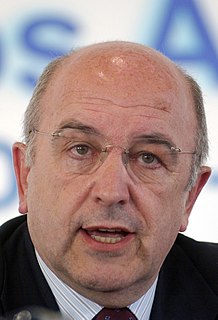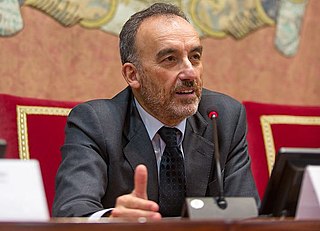
The politics of Bolivia takes place in a tree of a presidential representative democratic republic,whereby the president is head of state,head of government and head of a diverse multi-party system. Executive power is exercised by the government. Legislative power is vested in both the government and the two chambers of parliament. Both the Judiciary and the electoral branch are independent of the executive and the legislature. After the 2015 election,53.3% of the seats in national parliament were held by women,a higher proportion of women than that of the population.

Josep Borrell Fontelles is a Spanish-Argentine politician serving as High Representative of the Union for Foreign Affairs and Security Policy since 1 December 2019. A member of the Spanish Socialist Workers' Party (PSOE),he served as President of the European Parliament from 2004 to 2007 and as Minister of Foreign Affairs,European Union and Cooperation in the Government of Spain from 2018 to 2019.

Alberto Ruiz-Gallardón Jiménez is a Spanish politician and former Minister of Justice. He was mayor of Madrid between 2003 and 2011. A stalwart of the conservative People's Party (PP),he has previously been a leading figure in various local and national legislative bodies. In December 2011 Ruiz-Gallardón was appointed Minister of Justice in Mariano Rajoy's inaugural cabinet. He resigned in September 2014.

Joaquín Almunia Amann is a Spanish politician and formerly,prominent member of the European Commission. During his tenure in the two Barroso Commissions,he was European commissioner responsible for economic and monetary affairs (2004–2009) and,subsequently,vice-president and the European Commissioner for Competition (2009–2014). Previously,he had been Spanish Minister for Employment (1982–1986) and Public Administrations (1986–1991). From 1997 to 2000,he was the leader of the opposition as secretary general of the Spanish Socialist Workers' Party,standing in and losing the 2000 Spanish general election against the then incumbent Spanish prime minister,JoséMaría Aznar.

The General Council of the Judiciary is the national council of the judiciary of Spain. It is the constitutional body that governs all the Judiciary of Spain,such as courts,and judges,as it is established by the Spanish Constitution of 1978,article 122 and developed by the Organic Law 6/1985 of the Judicial Power (LOPJ). The President of the CGJP is also the president of the Supreme Court.

The Supreme Court is the highest court in the Kingdom of Spain. Originally established pursuant to Title V of the Constitution of 1812 to replace —in all matters that affected justice—the System of Councils,and currently regulated by Title VI of the Constitution of 1978,it has original jurisdiction over cases against high-ranking officials of the Kingdom and over cases regarding illegalization of political parties. It also has ultimate appellate jurisdiction over all cases. The Court has the power of judicial review,except for the judicial revision on constitutional matters,reserved to the Constitutional Court.

Antoni Comín,born in Barcelona on March 7 1971,is a Catalan intellectual and politician from Spain. He is currently the executive vice-president of the Council for the Republic and has been an MEP since July 2019. He is the fourth child of the politician and intellectual Alfonso Carlos Comín i Ros and Maria Lluïsa Oliveres i Sanvicens,whose other children are Maria,Pere and Betona. He is the partner of the stage designer Sergi Corbera,and they have a daughter called Laia.

The president of the Constitutional Court of Spain is the head of the Constitutional Court,the highest body with the power to determine the constitutionality of acts of the Spanish central and regional governments. It is defined in Part IX of the Constitution of Spain,and further governed by Organic Laws 2/1979. The court is the "supreme interpreter" of the Constitution,but since the court is not a part of the Spanish Judiciary,the Supreme Court is the highest court for all judicial matters.

Carlos Lesmes Serrano is a Spanish magistrate and prosecutor serving as President of the Supreme Court and President of the General Council of the Judiciary (CGPJ). Since December 2018,he serves in acting capacity in both posts,as his mandate expired at the time and the renovation of the CGPJ is blocked from then on. He is seen as a Conservative jurist with a religious background.

The President of the Supreme Court and also President of the General Council of the Judiciary is the highest judicial authority of the Kingdom of Spain and holds the representation of the judicial branch and its governing body,the CGPJ. The office of President of the Supreme Court is foreseen in the Constitution as well as giving to the president the presidency of the General Council of the Judiciary. As a parliamentary monarchy,the President of the Supreme Court is appointed by the Monarch after being nominated by the Plenary of the General Council of the Judiciary,who serves until the end of its 5-years-term,its dismissal by the CGPJ or its resignation.

The High Court of Justice of Cantabria (TSJC),is the highest court of the Spanish judiciary in the Autonomous Community of Cantabria. Established pursuant to Title VIII of the Spanish Constitution,it has original jurisdiction over cases against high-ranking officials of the autonomous community and appellate jurisdiction over all cases. The TSJC decisions may be appealed to the Supreme Court. It also has entrusted the resolution of conflicts of competence between courts in Cantabria. The Court has the power of judicial review over norms with lower rank than the law of the regional administrations.

JoséCarlos Dívar Blanco was a Spanish magistrate. He served as the 46th President of the Supreme Court and 6th President of the General Council of the Judiciary from September 2008 to June 2012.

María Margarita Robles Fernández is a Spanish judge and politician,currently serving as Minister of Defence since June 2018. From November 2019 to January 2020,she served as Acting Minister of Foreign Affairs.

Manuel Marchena Gómez is a Spanish judge and prosecutor. He currently serves as Magistrate of the Supreme Court and Chairman of the Criminal Chamber of the Supreme Court.

Alicia Miyares Fernández is a Spanish philosopher,feminist,researcher,and women's rights activists. She has served as the spokesperson for several feminist organizations including anti-womb renting No Somos Vasijas and Recav. She has been involved with the efforts to keep abortion legal,writing the manifesto for the 2014 Tren de la Libertad. Miyares Fernández was active in advocating feminist causes ahead of the 2019 Spanish general elections.
The Vice President of the Supreme Court is the second highest authority of the Supreme Court of Spain and its main duty is to support and replace the President as head of the Court. The vice president is appointed by the Monarch after being nominated by the General Council of the Judiciary at the proposal of the president of the council. It has a term of five years.

Pascual Sala Sánchez is a Spanish jurist. He was president of the Spanish Supreme Court and of the General Council of the Judiciary between 1990 and 1996,and was later president of the Constitutional Court,between 2011 and 2013.

Carlos Fabra Carreras is a Spanish politician and businessman. He was president of the Provincial Council of Castellón from 1995 to 2011 and one of the leaders of the Partido Popular in the province. He was president of the public company that manages Castellón airport until 22 March 2013,when he resigned after learning that he would be tried in court. He was prosecuted for various offences of influence peddling,bribery and five tax offences,and was sentenced in November 2013 to four years in prison for defrauding the tax authorities of 700,000 euros.
Francisco Marín Castán is the President of the Civil Chamber of the Supreme Court. He assumed the office in February 2021 after Juan Antonio Xiol Ríos. He is also the Vice President of the Supreme Court since June 2020. Francisco Castán,a professor of procedural law and magistrate. He is a member of the Francisco de Vitoria Association of Judges and Magistrates which he previously served as acting president of the aforementioned Supreme Court.
















